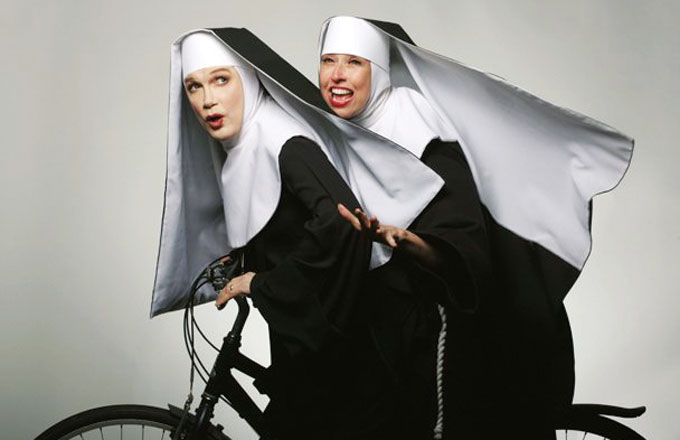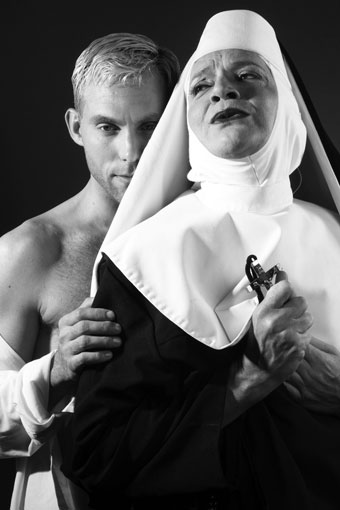The Divine Genius of Charles Busch
by Anthony Chase


The Divine Sister at BUA
Comedy seldom commands the respect of serious, or even dreary drama. Rare is the comic playwright who attains the level of respect afforded his most mediocre contemporaries. Molière himself had to endure the abuse of conventional 17th-century critics. George Jean Nathan, arguably the most influential critic of the early 20th century, championed Eugene O’Neill, but predicted literary oblivion for Noël Coward.
Well, he who laughs last, as they say.
Charles Busch, author of The Divine Sister, now playing at BUA Theater on West Chippewa, is a true comic genius, and one who is enjoying accolades during his own time. As with every true genius of comedy, part of Busch’s gift is his seemingly effortless ability to channel an impulse toward rebellion into an avalanche of silly laughter. His method may be decidedly low-brow, but his mission is absolutely subversive.
In The Divine Sister, we meet Mother Superior whose convent school is on the verge of collapse, and who has a postulant in residence who claims to have divine visions and the power to heal—all this, happening on the eve of a visit from severe Sister Walburga, from the mother convent in Berlin.
Do not, of course, expect these serious and high-minded concerns to be handled with reverence. The ribald journey that unfolds is an artful pastiche of every Hollywood nun picture, from The Song of Bernadette to The Singing Nun, to The Trouble With Angels, to Doubt.
And while the play premiered in New York just last year, this is not an update. In fact, it is a willful throwback to the days when nun pictures were popular and taken seriously. Mother Superior is far from modern or progressive in her views. Rather, this well-intentioned and warmly cheerful woman is a right-wing terror. She opposes reproductive rights, historic preservation, and even moral debate.
“We are living in a time of great social change!” she observes amiably, adding “We must do everything in our power to stop it!” Her loving advice to an obviously gay schoolboy, bullied by his classmates, is to put his troublesome desires into an imaginary box, bury that box, and trust that in time he will forget that he ever had those feelings at all.
Indeed, there is something deeply meaningful, serious, and even horrifying at the heart of this Charles Busch comedy.
The script is part of a dramatic tradition that begins with the work of Charles Ludlam (1943-1987), legendary mastermind behind the Ridiculous Theatrical Company founded in Manhattan in the 1960s. Like Busch, Ludlam was known for playing the leading ladies in his own plays, which were typically pieced together from fragments of well-known works from obsolete genres. The opening scene of Ludlam’s The Mystery of Irma Vep, for example, is lifted directly from Henrick Ibsen’s Ghosts—word for word. Ludlam’s replaying of Ghosts, however, is a comedy with a leading lady played by a man in drag. Other fragments are easily recognized from such sources as the work of Edgar Allan Poe and Oscar Wilde, Sir Arthur Conan Doyle’s The Hound of the Baskervilles, Hollywood horror films of the 1930s, and Alfred Hitchcock’s 1940 film Rebecca. In plays like Big Hotel (1967), Camille (1973), and Salammbô (1985), Ludlam made no attempt to conceal his source material. On the contrary, he reveled in his outrageous co-optations and subversions, making them a central focus of the entertainment.
This is precisely the strategy employed by Busch in plays like The Divine Sister, The Lady in Question, or Shanghai Moon. Popular culture of the 20th century has been an inspiration to a generation of Ridiculous literary efforts—and the more repressive the source material, the better. Gay Argentine novelist Manuel Puig returned to films of the 1930s and 1940s repeatedly in such works as his 1968 novel, La traición de Rita Hayworth (Betrayed by Rita Hayworth), and his 1976 novel, El beso de la mujer araña, (Kiss of the Spider Woman). In the latter, Molina, a homosexual window dresser, actually passes time in prison with blissful reminiscence of films from the Nazi era.
Paula Vogel’s 1992 comedy, The Baltimore Waltz, deliberately used the clichés of film noir of the 1940s and 1950s to comment on reactions to AIDS. Whereas serious plays like Larry Kramer’s The Normal Heart (1985) and William M. Hoffman’s As Is (1985) provided didactic documentary of the epidemic, Vogel took the ridiculous path of comic appropriation to accomplish an entirely different but equally powerful effect.
There are entire genres that have entirely evaporated into comedy since the advent of women’s liberation, gay liberation, and the Civil Rights movement. Who could take them seriously anymore? Charles Busch gravitates toward these like a homing device. Charles Ludlam, and Charles Busch recycle over-worn cultural clichés and revitalize them through comedy. What women of previous eras played as drama, men in drag co-opt for comedy, making new statements about cultural oppressiveness.
Busch is often attracted to specific moments of decadence or repression. His decadent plays include Theodora, She-Bitch of Byzantium and Vampire Lesbians of Sodom (1984). His plays of repression include Red Scare on Sunset (1991), in which, at the climactic moment, the leading lady smugly provides names to the House Un-American Activities Committee. Pardon My Inquisition (1986) is a comic romp through the Spanish Inquisition. Shanghai Moon (1999) is a reworking of such Broadway and Hollywood “oriental” melodramas as The Letter, Shanghai Express, and the 1915 silent classic, The Cheat, in which women of the West fall prey to the lustful enticements of the Orient. The overwrought heroines of Douglas Sirk’s 1950s melodramas live again in Die, Mommy Die! (1999).
It was only a matter of time before a generation of cheerfully repressed nuns returned in a Charles Busch play. Enter The Divine Sister.
For the cinematically knowledgeable, half the fun of The Divine Sister is to spot the references: the postulant with stigmata from Agnes of God; the severe German nun from Lilies of the Field; Gladys Cooper’s famed “How can you who have never felt pain dare to say you are the chosen one?” speech from Song of Bernadette; the bike-riding, guitar-playing sister of The Singing Nun; Rosalind Russell’s “I found something better” speech from The Trouble With Angels—melded to Russell’s motto that “life’s a banquet” from Auntie Mame; the preposterous mysteries and conspiracies of The Da Vinci Code; Peggy Wood’s stilted query, “What is it you cun’t face?” from The Sound of Music; and on and on and on.
Busch has constructed a taught social critique within a ridiculous, at times inane comedy, and that is the essence of his genius. The BUA production of The Divine Sister has been directed by Chris Kelly and features an adept crew of zanies: the divine Jimmy Janowski as Mother Superior; Beth Donohue as Sister Walburga; Kerrykate Abel as Sister Acacius; Caitlin Coleman as Mrs. Levinson; and Michael Seitz as Jeremy. Performances continue through December 3.
|
Issue Navigation> Issue Index > v10n47 (Gift Guide, week of Wednesday, November 23) > Theater Week > The Divine Genius of Charles Busch This Week's Issue • Artvoice Daily • Artvoice TV • Events Calendar • Classifieds |









 Current Issue
Current Issue